Breaking the Monotony
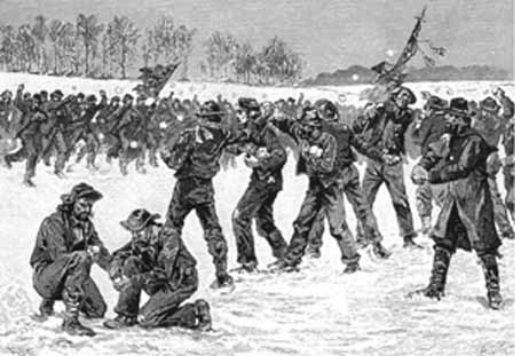
Snowball battle near Fredericksburg, Va. (February 25, 1863) - from WeatherBook.com.
Soldiers found many ways to combat boredom and loneliness during long spells in camp, bivouac, or winter quarters. These included music, reading, card playing, board games, writing and receiving letters, and outdoor sports. A number also turned to liquor, ranging from legitimate products smuggled into places where soldiers gathered to home-made brews that could pack quite a wallop—sometimes fatally. And, of course, female companionship was constantly pursued.
Music
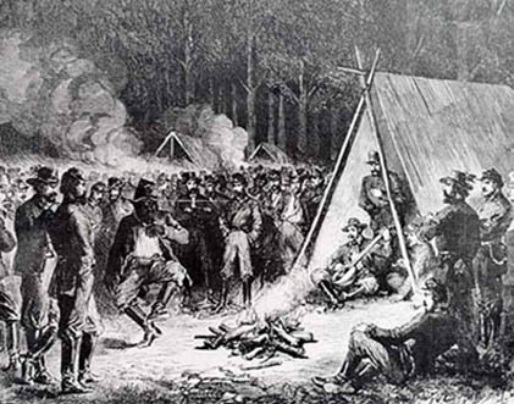
Music perhaps topped the list of soldier pastimes. Robert E. Lee went so far as to say, “I don’t believe we can have an army without music.” Some men brought banjos or other musical instruments (including guitars and fiddles) from home and played them when opportunity arose. Formal bands were formed by some regiments. The 5th Virginia Infantry, for example, had a band made up of regular fighting men who took up their instruments for concerts or for pleasure. Confederates had fewer bands than the Union army, but enjoyed listening to Federal bands when in close proximity. Sometimes they requested that the Union bands play some Southern favorites, a request often fulfilled. Bands from both North and South sometimes provided music on the march or to inspire troops before an attack.
They also on occasion gave impromptu concerts on the battlefield at night after darkness had caused a temporary cessation of hostilities. These frequently followed a pattern of one band playing tunes of its side and the other responding with its favorites. Such “concerts” often ended with one band or the other playing a sentimental tune such as “Home, Sweet Home.”
Singing also was a favorite diversion. Many songs reflected the sentimentality of America’s mid-19th century culture, tunes such as“Lorena,” “Ora Lee,” or “Who Will Care for Mother Now.” But patriotic tunes also were popular, songs such as “Bonnie Blue Flag” and “Dixie” on the Southern side. Soldiers also liked to compose parodies, particularly of songs fashionable on the other side. Fun songs on both sides included “Listen to the Mocking Bird” and “Pop Goes the Weasel.” Singing might “break out” at any time—in camp, on the march, or in winter quarters. Sometimes two or three soldiers would sing informally, but often this activity involved larger groups, even up to regimental size. Formal concerts were not unknown.
Reading
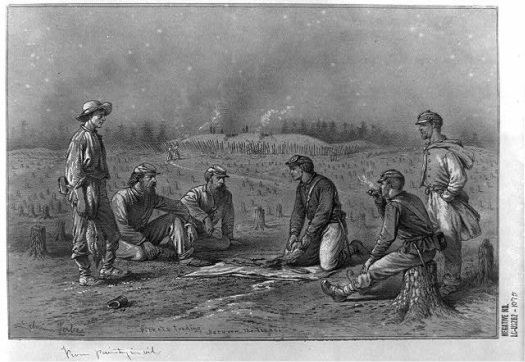
Confederate and Union pickets trading newspapers, etc.
Reading, along with music, was at the top of the list of soldier pastimes. Soldiers read newspapers ranging from hometown papers to ones published in Richmond, New York, and other major population centers. Confederates often had access to Northern newspapers through trade with Union troops during quiet periods between battles.
Soldiers also liked magazines such as Harper’s Weekly, Frank Leslie’s Illustrated, and the Southern Illustrated News with their sketches of battles, camp life and prominent military and civilian leaders. A considerable portion of the available reading material had a religious theme. This included Bibles, either brought from home or distributed by Christian denominations. Christian organizations also distributed religious tracts covering many topics. Soldiers also enjoyed books ranging from cheap“dime novels” to works by such authors as Shakespeare and Walter Scott. Literate soldiers frequently read various published works aloud to illiterate or semi-literate comrades. Letters from home were greatly prized and soldiers often were pressured by companions to read aloud at least part of letters received.
Cards and Board Games
Card playing was pervasive in both armies, sometimes simply for fun but more often for money or other material items such as watches, knives,
rings, and blankets. Gambling was not only frowned upon by pious soldiers but by many officers as well. Robert E. Lee in late 1862 noted that he was “pained to learn that the vice of gambling” was common in his army. Card games included poker, euchre, keno and twenty-one. Cards and dice were used for faro and chuck-a-luck. Playing cards eventually wore out, and new decks were bought from sutlers (camp or traveling store keepers) or taken from Union prisoners or dead soldiers on the battlefield. Many superstitious soldiers threw away cards and dice upon going into battle, only to acquire them again if they came through the fight safely. Popular board and similar games included checkers and dominoes. Even chess had its devotees.
rings, and blankets. Gambling was not only frowned upon by pious soldiers but by many officers as well. Robert E. Lee in late 1862 noted that he was “pained to learn that the vice of gambling” was common in his army. Card games included poker, euchre, keno and twenty-one. Cards and dice were used for faro and chuck-a-luck. Playing cards eventually wore out, and new decks were bought from sutlers (camp or traveling store keepers) or taken from Union prisoners or dead soldiers on the battlefield. Many superstitious soldiers threw away cards and dice upon going into battle, only to acquire them again if they came through the fight safely. Popular board and similar games included checkers and dominoes. Even chess had its devotees.
Outdoor Games
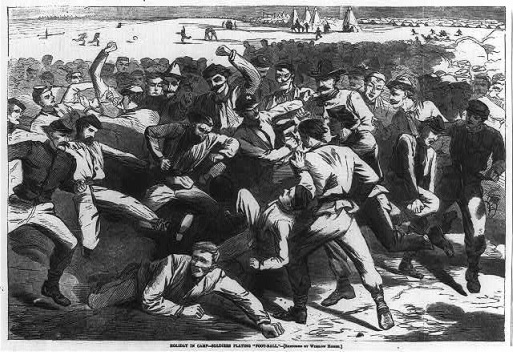
Civil War soldiers playing a rudimentary form of football.
Outdoor activities in mild or warm weather included foot races,
wrestling, boxing, leapfrog, marbles, swimming, Prisoner’s Base and even rudimentary forms of baseball and football. Baseball bats were made of boards, sections of a rail fence, or a slightly trimmed hickory limb. Balls usually consisted of yarn or leather wrapped around a hard center such as a walnut with
its covering still on. Winter sports included snowball battles, sometimes up to regimental or even brigade strength. Often the soldiers carried battle flags and occasionally threw snowballs packed around rocks or other hard objects. Another popular winter-time activity was sledding on barrel staves or other makeshift sleds. Fishing and hunting were also activities soldiers engaged in when opportunities arose.
Female Companionship
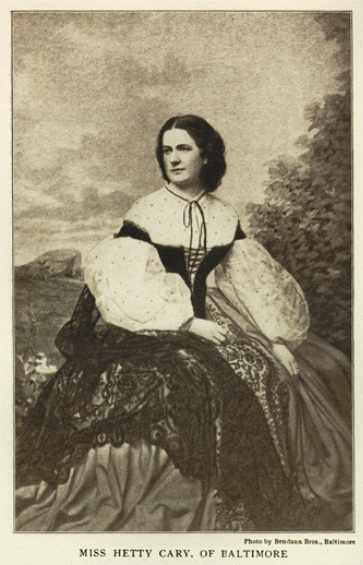
Hetty Cary was a vivacious and popular socialite in Richmond during the war.
A favorite pastime sought by most soldiers was female companionship, either in person or by letter. When camped near a town or city, soldiers were sometimes invited to parties, dances or other activities where they could meet the ladies
Drama also provided a way to mix with women. A number of regiments or brigades formed their own drama groups to put on plays for their comrades, but also as an excuse to invite women to camp to see the performances. The principal offerings were minstrels and comedies. However, some groups presented scenes from Shakespeare or other classics. Productions aimed at soldiers only were most frequently performed outdoors with spectators seated on log benches or on the ground. The more elaborate ones, to which women were invited, usually were performed in available shelters including theaters in nearby towns.
Many Confederate soldiers sought a more-assured companionship by visiting bawdy houses in such cities as Richmond and Petersburg, or by finding willing women in rural areas near campsites. This practice, however, could be expensive and also could lead to serious bouts with venereal disease.